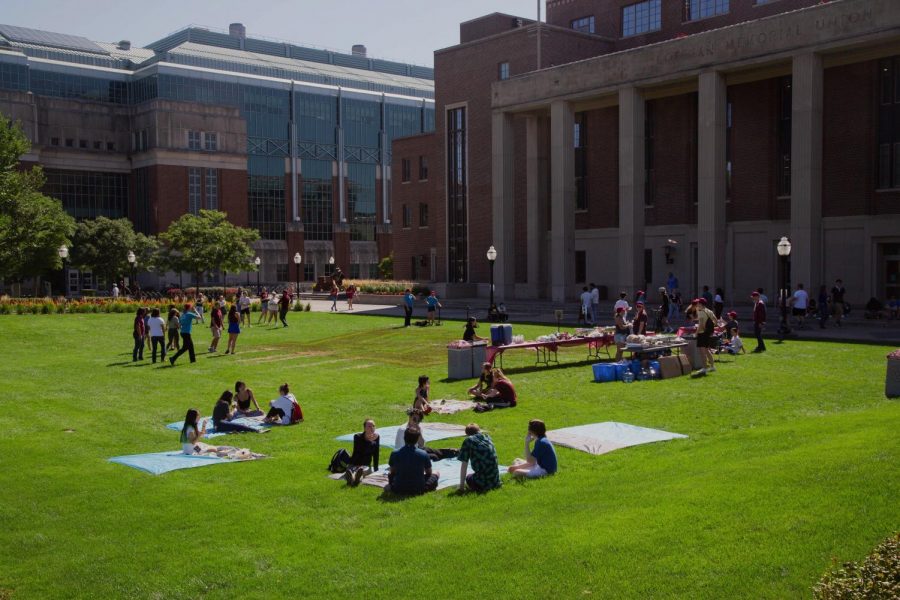As summer falls into autumn and thousands of students flock to campus for in-person classes, many students are voicing their support of the University of Minnesota’s indoor mask mandate and student COVID-19 vaccine requirement.
Generally, students said they want to return to in-person classes and campus experiences, and the masks and vaccines provide greater comfort to enjoy face-to-face moments while still helping to protect the health of others. The University announced an indoor mask mandate on Aug. 3 for all buildings on campus. After the U.S. Food and Drug Administration approved the Pfizer COVID-19 vaccine for non-emergency use on Aug. 23, the University also announced a vaccine requirement for students.
“You’re helping your neighbor, you’re helping to protect other people,” Megan Hylton, a second-year student, said. “So, it’s nothing to put a mask on and get a vaccine.”
Taking small precautionary steps like wearing masks to mitigate the spread of COVID-19 matters in order to help prevent hospitalizations and long-term effects of the virus, some students said.
“If we are wearing masks, if we are doing this, every little step we take is going to bring down the percentage and chance of, for one, getting COVID,” said Madeline Ahern, president of Nu Sigma Nu, a medical fraternity. “But secondarily being hospitalized and finally ending up on a ventilator.”
Many students said they support the mask mandate and vaccine requirement because they want to return to campus and meet their peers in-person.
“I think for me going [into] my first year of college, especially not knowing people … having that in-person [experience] is a big relief,” first-year student Alina Schenk said.
While many students are excited to return to in-person classes, others think there should be more online or hybrid options for larger classes to promote safety.
“Some of us have really big class sizes,” said Navya Koneripalli, co-president of the University’s Undergraduate Public Health Association. “It just takes one person who didn’t get tested or one person who says they tested negative but tested positive, and the entire class is at risk”.
Students have until Oct. 8 to report their vaccine status or submit a medical or religious exemption. The University released preliminary response results on Sept. 2, which stated that 98.7% of Twin Cities students who responded reported being fully vaccinated.
Some students said they are worried about the online form that the University is using for vaccine proof because students do not have to submit documentation. Similar to other required vaccines at the University, the form only requires the dates of students’ vaccine doses rather than uploading an image or copy of a vaccine card.
“I thought it’d be pretty simple to just take a picture or scan in your vaccine card, so I was shocked at first because it’s easy [to lie],” Kameela Douiyssi, a third-year student, said.
Another concern some students share is the lack of a vaccine requirement for professors. The University does not require faculty to be vaccinated because there is no faculty vaccine policy, according to University leadership.
Instead, faculty need to fill out an attestation form marking whether they are vaccinated. Over 98% of staff and faculty from the Twin Cities campus have reported they are fully vaccinated.
“I would prefer if there were vaccination requirements for professors,” Hunter Slingbaum, a third-year student said. “Having entirely normal classes and not having confirmation that my professor is vaccinated would make me feel a little uncomfortable.”
In addition, some students said they believe it makes more sense to have a universal vaccine mandate because that is the only way to protect everyone’s health.
“The whole point of the vaccine is that if everyone gets it, we’re all safe,” Fong Vue, a first-year student said. “But, if the professors aren’t required, then there’s no point in forcing everybody else to get it.”
After the isolation of quarantining and stress of online classes, some students said they experienced heightened anxiety and mental health struggles. Going forward, many students said they feel the University should invest more into mental health resources.
“To better support students during this, I’d say [the University should] put more resources into reducing stress from the pandemic,” said Jovany Betancourt, a member of the University’s Infectious Disease Interest Group.
Although many students said they want to return to in-person learning and “normal” college life, some students are still worried about their safety and the safety of others — especially when it comes to the long-term effects of the virus, such as the loss of taste and smell.
“I’m pretty terrified of it,” Hylton said. “I think it’d kind of suck if I couldn’t taste my Fruit Loops.”


















